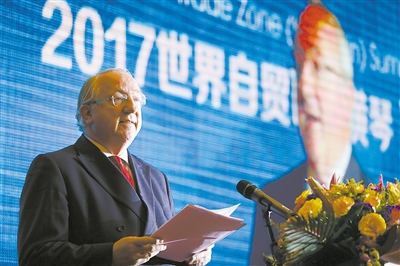Young and old free trade zones share ideas in Zhuhai

The World Free Trade Zone (Hengqin) Summit 2017 ran at the Zhuhai International Convention & Exhibition Center from June 19 to 20. Themed the Development Trend of Chinese Free Trade Zones, it was sponsored by the World Free Zone Convention and Recycling Times Group to improve Chinese FTZs by sharing expert advice and overseas experiences.
More than 20 experts, representatives from 11 Chinese pilot zones, almost two dozen international FTZs, cross-border investment organizations, and enterprises took part.
They discussed policy research, world trade and logistics, economic planning, and financial capital. They also shared in-depth views on free trade development and the prospects of Chinese pilot zones.

Graham Mather, chairman of the World Free Zone Convention [Photo by Li Jianshu / Zhuhai Daily]
Mao Yanhua, deputy head of the Free Trade Zone Research Institute of Sun Yat-sen University, presented research results from the construction of FTZs over the past three years and addressed the differences between Chinese and foreign trade zones.
Mao said the key to pilot FTZs is the soft institutional environment, which determines whether an enterprise can benefit from cost savings, production efficiency, convenient customs clearance, and other favorable conditions.
She also detailed functional positioning of different FTZs. Those in Shanghai, Guangdong, and Tianjin are comprehensive with well-rounded businesses and do well in institutional innovation, tasking themselves to carry out regional development and national opening-up strategies.
Among them, the China (Guangdong) Pilot FTZ, to which the Hengqin FTZ belongs, enhances cooperation with Hong Kong and Macao, and supports development of the Guangdong-Hong Kong-Macao Greater Bay Area and hub construction for the 21st Century Maritime Silk Road.
According to the latest research, the Guangdong FTZ increased by 27.5 percent, 41 percent and 62.2 percent respectively in trade convenience, investment friendliness, and cross-border finance.
Also relying on system and mechanism innovation, the third batch of pilot zones in Zhejiang, Liaoning, and other provinces, however, are focusing on functions suitable for local situations.
Representatives from the Netherlands, Thailand, and Costa Rica FTZs elaborated the latest information they have on operation modes and port shipping.
In recent years, Chinese FTZs have developed remarkably compared to FTZs overseas, commented Graham Mather, chairman of the World Free Zone Convention. He encouraged sustaining that important role by way of learning from successful experiences of overseas FTZs through strengthened international exchanges and cooperation.
MOST POPULAR
- 1 $39.7 billion worth of deals inked at Airshow China
- 2 China announces tax relief measures to stabilize real estate sector
- 3 A look at China's economy in October, 2024
- 4 Public holiday extension announced
- 5 China's NEV annual production hits 10 million milestone amid global carbon reduction efforts
Editors' Picks
 Infographic:
Golden jubilee of China-Brazil relations
Infographic:
Golden jubilee of China-Brazil relations
 Infographic:
A look at China's economy in October 2024
Infographic:
A look at China's economy in October 2024





